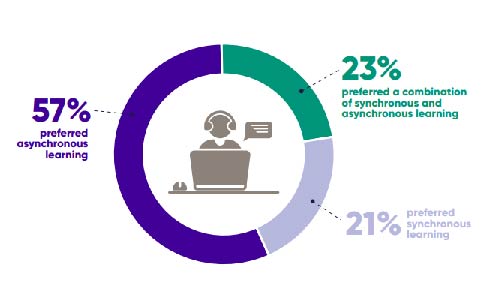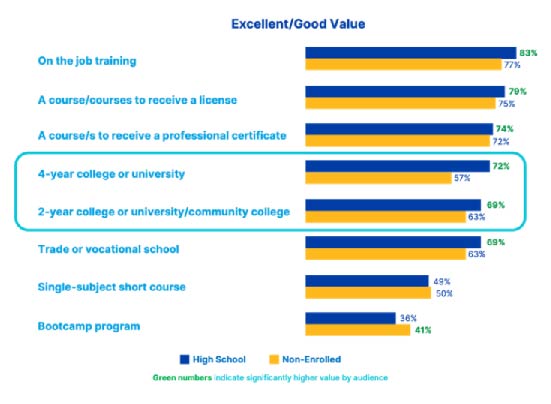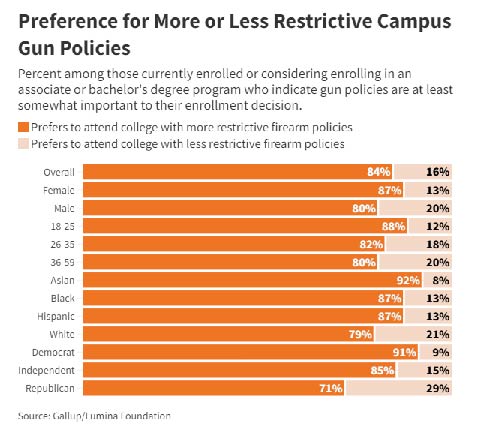March, 2024 Eye on Research
Commentary
Continuing the theme from the last few blogs of whether 4-year degrees will be more or less required for future employment, I found an interesting report. The Harvard Business School and the Burning Glass Institute observed a significant increase from 2014 through 2023 in job ads without degree requirements. Read the recent report here. However, real-world hiring practices show only a minor increase in job advertisements for hiring candidates without degrees. Skills-based hiring requires removing degree language from ads and implementing significant changes in hiring practices. This brings to mind the question, “Is the rhetoric on the elimination of the need for a 4-year degree misleading for learners and the workforce?”
Related to this topic, a colleague shared the Occupational Mobility Explorer, released by the Federal Reserve Bank of Philadelphia in 2020. This tool is designed to help “workers to transfer their skills from one occupation to a similar–but higher-paying–occupation in the same labor market.” If these data were paired with credit-for-prior-learning opportunities at colleges and universities, one could conceivably build a tool for economic mobility and paths to degree/certificate attainment for those without a college degree.
______________________________________________________________________
On a different note, I ran across the CUPA-HR Job Description Index that “provides access to sample job descriptions for positions unique to higher education.” We regularly receive emails from members asking about sample job descriptions; this is an excellent resource for that task.
AACRAO Research Update
Credit-for-Prior-Learning (CPL) Survey Completed
A big thank you to our partner CAEL and our AACRAO members. We received 399 responses to the comprehensive credit-for-prior-learning survey. Data analysis is in the early stages, and a report will be forthcoming. A few key data points are included below to pique your interest.
-
82% of institutions offer one or more opportunities for undergraduate learners to earn CPL
-
43% of institutions with graduate and/or professional learners offer CPL
-
54% of institutions will not accept transfer CPL awarded at another institution
Impact of Statewide Transcript Hold Bans in Preparation for the July 1, 2024 Regulation Change
We are about to begin a research project to examine the impact of statewide transcript bans. We hope to benchmark current plans for implementing the new federal regulation on the use of transcript holds for debt in states without statewide bans. This research will be conducted in early April, with the first of two webinars scheduled for early June and the second at a date TBD. We want to share the benchmarking data before the regulation takes effect. We also hope to have additional guidance from the Department of Education at that time.
Current Higher-Education Research and Related Topics
Report Examines Demands and Preferences of Online College Students
A survey by Education Dynamics of over 3,000 prospective and active online students has been released in this report (download required). This extensive report contains many illuminating infographics on demographics and student preferences. Figure 1. The report also reveals 14 key findings and recommendations for institutions of higher education on how to serve online learners.
Figure 1: Preferred Delivery of Online Program

Source: “Online College Students Report 2024,” n.d. https://insights.educationdynamics.com/online-college-students-report-2024-confirmation.html.
Educational Needs of Rural Populations Included in New Report
A new report from the Georgetown University Center on Education and the Workforce calls for investment in higher education for rural communities. The report highlights many difficulties rural areas experience, such as a declining population, and features areas of opportunity for higher-education institutions.
Research Funded by the Gates Foundation Explores Student Perceptions of U.S. Higher Education
A collaboration between the Gates Foundation, HCM Strategists and Edge Research examined 18- to 30-year-old citizens who did not enroll in college programs. The report revealed a variety of views on the value of higher education. In 2023, research expanded to include current high-school students. Research explored their needs and preferred support during their college-education journeys. The research used a focus-group methodology. The study discovered those who did not enroll in college and high-school students seek education or training that is shorter term, less expensive and more directly related to employment. Figure 2.
Figure 2: Value of Education and Training Opportunities

Source: “Student Perceptions of American Higher Education,” n.d. https://usprogram.gatesfoundation.org/news-and-insights/articles/student-perceptions-of-American-higher-education.
State Politics Can Influence College Choice
New research from Gallup and the Lumina Foundation examined the effects of state politics on students' college choices. The research found state policies or laws on divisive political issues strongly affect where students choose to attend college. Figure 3 highlights one policy. Those effects persist across racial, gender, geographic and political differences. The report highlights gun control and abortion rights as examples.
Figure 3: Preference for More or Less Restrictive Campus Gun Policies

Source: Knox, Liam. “Are State Politics Becoming an Enrollment Issue?” Inside Higher Ed | Higher Education News, Events and Jobs, March 14, 2024. https://www.insidehighered.com/news/admissions/traditional-age/2024/03/14/are-state-politics-becoming-enrollment-issue?utm_source=Inside+Higher+Ed&utm_campaign=efa41c2685-DNU_2021_COPY_02&utm_medium=email&utm_term=0_1fcbc04421-efa41c2685-235994325&mc_cid=efa41c2685&mc_eid=b5cf3cfc15.
Research Examines How Effect State-Funding-Model Changes Affect Student Outcomes
Research funded by the Gates Foundation and published by the American Educational Research Association shows changes to state funding models, including performance-based funding, do not affect student success at public universities. For community colleges, funding that combines a base with the addition of performance incentives increases enrollment, but not completion, by students. The study examined accessible data from over 1,500 institutions over the period between 2004 and 2020. The study raises concerns about the harmful effects of performance-based funding on racial/ethnic minorities and learners with lower incomes.